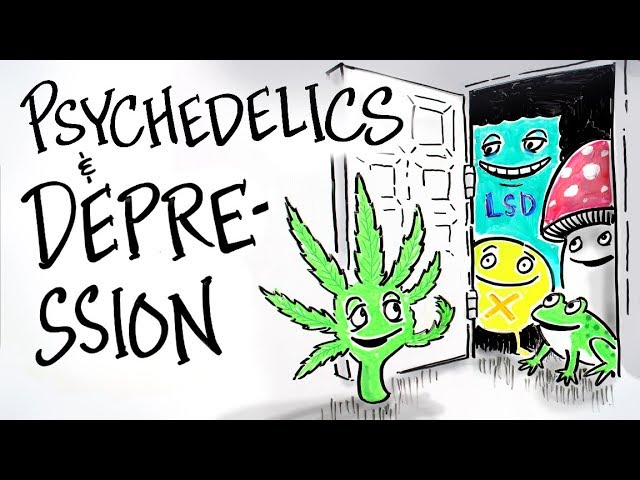Could Psychedelics Be The Cure For Depression?
Please help us keep this channel running by supporting us on Patreon https://www.patreon.com/AfterSkool
In the 50 years since this golden era, scientific progress in psychedelic research has been limited. A backlash against the hippy counterculture – “the war on drugs” – halted research into psychedelics. In 1971, the UK parliament introduced the Misuse of Drugs Act, classifying psilocybin, LSD and DMT as illegal class A drugs. All further research on psychedelics was banned.
The definition of a schedule 1 drug, which the most illegal classification, is a substance that has no currently accepted medical use and a high potential for abuse. Since the 1970’s there has been strong advocacy to take cannabis off the schedule 1 list. Cannabis has been found to improve many health issues, such as seizures, sleep disorders and arthritis. Although cannabis still remains on the schedule 1 list today, The evidence is so strong in favor of medicinal marijuana that it has become legalized in over half the U.S states and many countries around the world.
The legalization of cannabis has opened the door to re-examine the possible medical benefits of other currently illegal substances, like psilocybin mushrooms, LSD, MDMA and DMT. The first new studies in over 30 years are finding that these so called dangerous drugs can have a profound positive impact on mental health when used properly.
Depression is a growing problem and antidepressants continue not to work for up to half of the people who take them. A recent study examined the treatment of 20 patients suffering from depression. Half took antidepressants and half took psilocybin. After three months, the antidepressant effects were found to be greater for those taking psilocybin than for people taking typical antidepressants and therapy. Patients said they went from feeling “totally disconnected” with themselves and the world to “connected”, and from repressing and avoiding emotions and memories to accepting them.
Unlike antidepressants, which are taken daily, psilocybin therapy would take place a few times over a series of months until the patient decides that they no longer need it.
In most cases, only a few sessions of psilocybin are needed to bring about permanent change. Other research has found a similar positive impact on depression with the use of LSD, DMT and Ketamine. The push for more research on psychedelics is growing fast, but we still need a much deeper understanding before this becomes mainstream.



![[ID: jvNU5bwzclI] Youtube Automatic](https://bizimtube.com/wp-content/uploads/2021/03/id-jvnu5bwzcli-youtube-automatic-236x133.jpg)
![[ID: 0yCJMt9Mx9c] Youtube Automatic](https://bizimtube.com/wp-content/uploads/2021/03/id-0ycjmt9mx9c-youtube-automatic-236x133.jpg)
![[ID: vAJM5EdDwjU] Youtube Automatic](https://bizimtube.com/wp-content/uploads/2021/03/id-vajm5eddwju-youtube-automatic-236x133.jpg)
![[ID: LxOmofEFub4] Youtube Automatic](https://bizimtube.com/wp-content/uploads/2021/03/id-lxomofefub4-youtube-automatic-236x133.jpg)
![[ID: wFAh77GBsHs] Youtube Automatic](https://bizimtube.com/wp-content/uploads/2021/03/id-wfah77gbshs-youtube-automatic-236x133.jpg)
![[ID: tjwrG4Debc4] Youtube Automatic](https://bizimtube.com/wp-content/uploads/2021/03/id-tjwrg4debc4-youtube-automatic-236x133.jpg)
![[ID: _28bYGZtnU8] Youtube Automatic](https://bizimtube.com/wp-content/uploads/2021/03/id-28bygztnu8-youtube-automatic-236x133.jpg)
![[ID: 1e7bhUjUEJ8] Youtube Automatic](https://bizimtube.com/wp-content/uploads/2021/03/id-1e7bhujuej8-youtube-automatic-236x133.jpg)
![[ID: QjyCviSKY2U] Youtube Automatic](https://bizimtube.com/wp-content/uploads/2021/03/id-qjycvisky2u-youtube-automatic-236x133.jpg)
![[ID: -5i-vB4-kFk] Youtube Automatic](https://bizimtube.com/wp-content/uploads/2021/03/id-5i-vb4-kfk-youtube-automatic-236x133.jpg)
![[ID: covHhQgr5kU] Youtube Automatic](https://bizimtube.com/wp-content/uploads/2021/03/id-covhhqgr5ku-youtube-automatic-236x133.jpg)
![[ID: mX7FEHws43A] Youtube Automatic](https://bizimtube.com/wp-content/uploads/2021/03/id-mx7fehws43a-youtube-automatic-236x133.jpg)